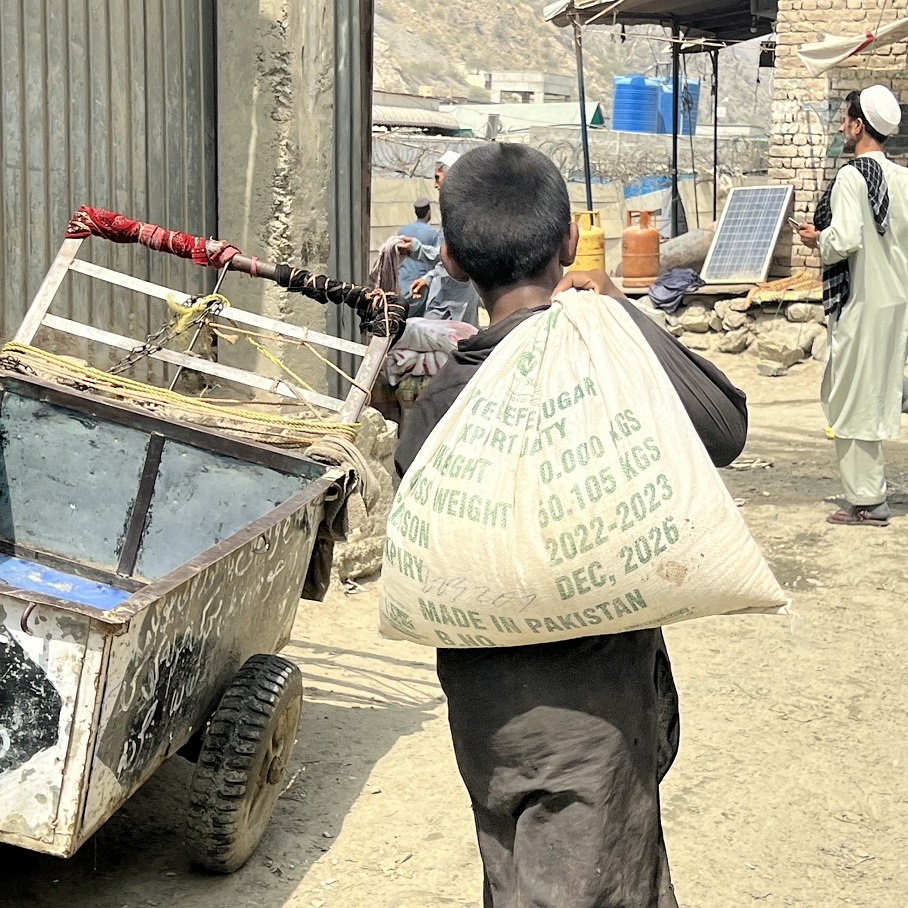On the Pakistan-Afghanistan border crossing at Torkham, there is a constant flow of people, goods, and commercial vehicles transporting essential items throughout the day. Young children are occasionally seen between these trucks and trailers, carrying bags of goods in their hands or shoulders, swiftly evading the vehicles and security personnel.
In the border area of Ghazgi in Afghanistan, young children, including five-year-old Mahna, are among them, carrying bags on their shoulders and crossing the Afghan border with several other children.
Wearing worn-out clothes and a patched-up shawl, Mahna, part of a family consisting of parents and four siblings, contributes to the family income. For the past year, she has been carrying a five-kilogram bag of sugar and jaggery to Afghanistan, bringing back cigarettes, soap, and cosmetics.
Mahna mentioned that to take goods from a commission agent or warehouse in Pakistan or Afghanistan and cross the border, she has to wait. When an opportunity arises at the border, she heads towards their home. Sometimes, she spends the entire night by the roadside, waiting for the chance to cross the border.
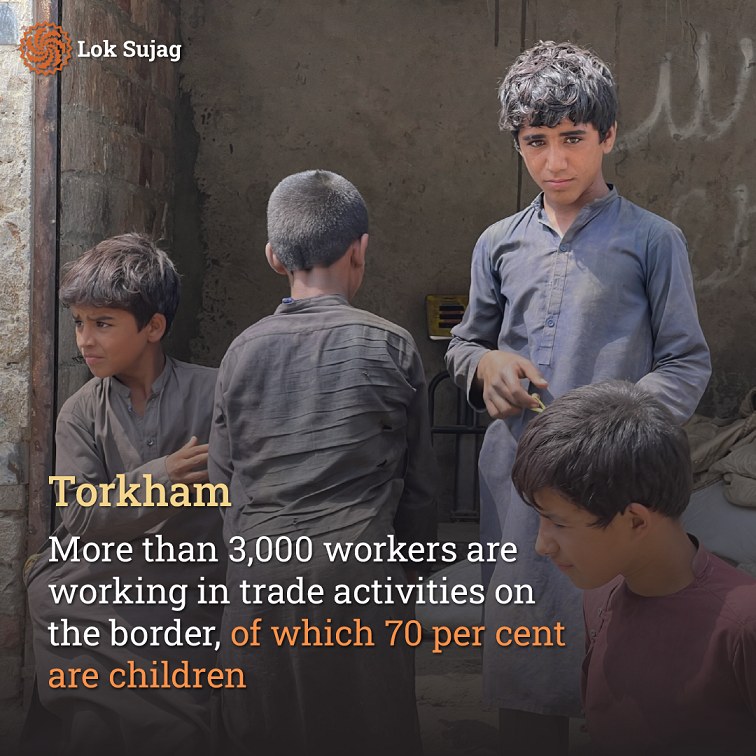
There are also some children whose parents engage them in smuggling commercial goods, and they come to the border on their own.
Sayed Mohammad Agha, the warehouse supervisor involved in sending and receiving goods across the border, explained that many children don’t have any adult family members with them. However, there are also some children whose parents work at our warehouse, and they bring their two or three children with them to facilitate the smuggling of goods across the border. On the other hand, they maintain connections with warehouse operators in Afghanistan to bring goods back when they return. Parents of these children also receive compensation for their work.
Former president of the labour union for workers in Torkham, Farman Shinwari, revealed that more than three thousand labourers are engaged in commercial activities at the border, 70 per cent of whom are children.
Seven-year-old Saddis is also from Afghanistan. She works as a labourer in Torkham, Pakistan, with her relatives and other neighbouring children.
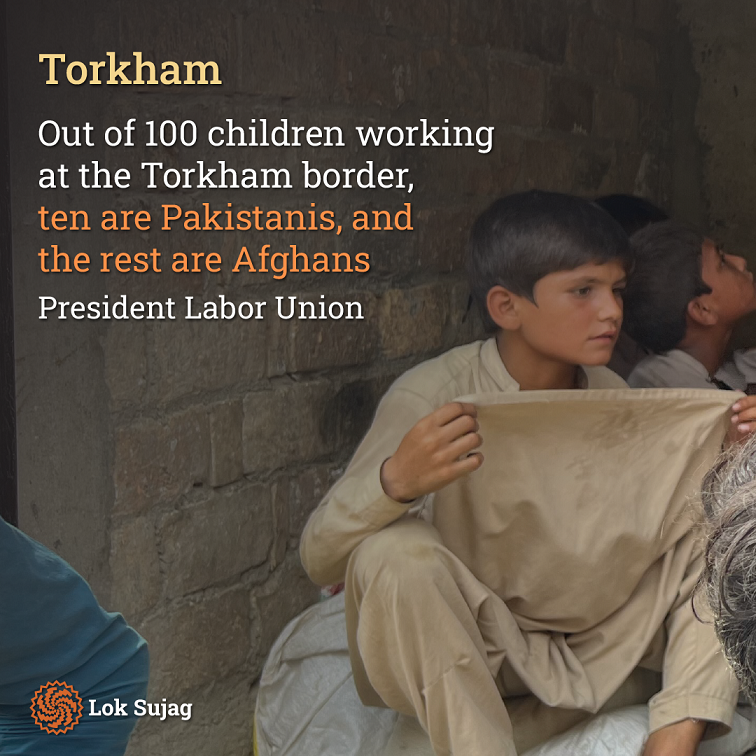
They carry a load of five to eight kilograms on their shoulders, walking for thirty minutes at the Pakistan border, while in Afghanistan, it takes forty minutes on foot. If there are no difficulties at the border, they make these trips twice or thrice a day; however, sometimes, they spend the whole day waiting.
Saddis’s home is located an hour away from Torkham. She returns home after a few days and gives his mother two to three thousand rupees, which is used to support her two brothers and three sisters.
She mentioned that incidents, sexual assaults, and violence against children are common in this line of work.
According to customs and federal investigative agencies (FIA), every day, around five thousand individuals cross the Torkham border with valid travel documents, while more than three thousand children enter illegally through Afghan-Pakistani border routes, smuggling items such as Shaving Razor from Afghanistan, Indian tobacco products, cigarettes, soap, cosmetics, and edible oil into Pakistan.
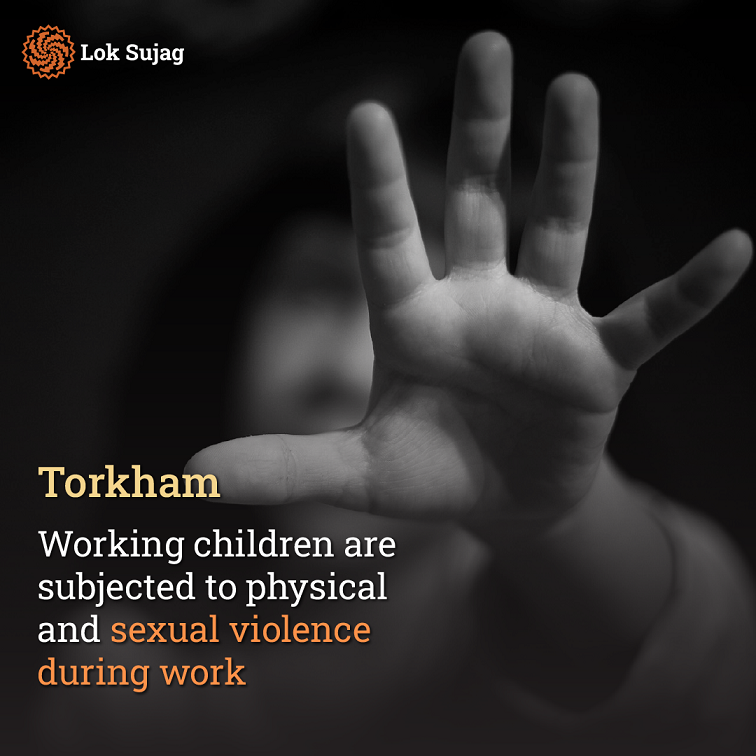
Recently, high-level border authorities from both countries participated in a meeting held at Afghanistan’s customs house on the border to discuss various issues, including the entry of children and their protection, in addition to other matters.
According to Farman Shinwari, the entry of children has not been completely restricted by law because in case of a complete restriction, children would attempt to cross on foot, climb over fences, or hide in vehicles and trailers, which can lead to accidents. However, he expressed reservations about the accuracy of the statistics regarding this issue.
During occasional meetings with Pakistani and Afghan border authorities, he also participates as a labour union representative. He claims that in every meeting, the authorities strongly emphasise the need for restrictions on children bringing and taking goods, and sometimes, they halt the movement of children at the border for several days.
He claimed thirty children have died in the past two years after being run over by goods-carrying vehicles. However, the government has no record of these children, and there is no system in place for financial assistance to their families.
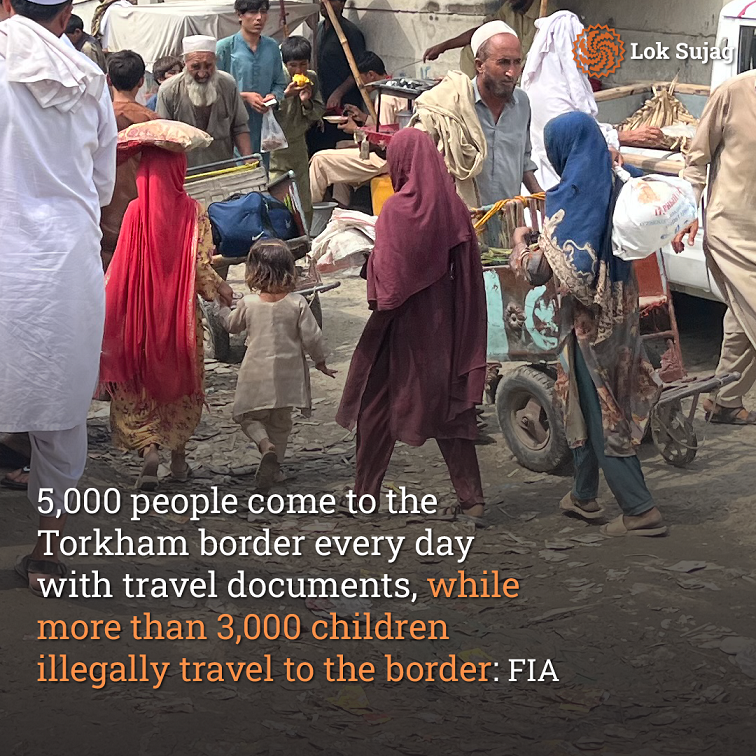
He said these children often stay near the border in open fields, along roadsides, in goods warehouses, and truck terminals, where they sometimes become victims of sexual violence.
The sexual abuse of child labourers
Azam Khan is twelve years old and hails from the Landi Kotal area of the Khyber district. He crossed the border on foot from Afghanistan and reached a warehouse located within Pakistan’s borders, carrying twenty packs (cartons) of cigarettes on his shoulders. Due to the sweat, his clothes are full of dust, and he is sitting near a water cooler to quench his thirst.
When asked about the marks and scars on their faces, he revealed that he has been subjected to physical abuse multiple times by Pakistani security personnel at the border and Afghan Taliban fighters.
Azam explained that during work, child laborers become targets for physical and sexual abuse. He mentioned an incident where he once went to a place provided by the warehouse manager to spend the night, and there, an attempt was made to molest him.
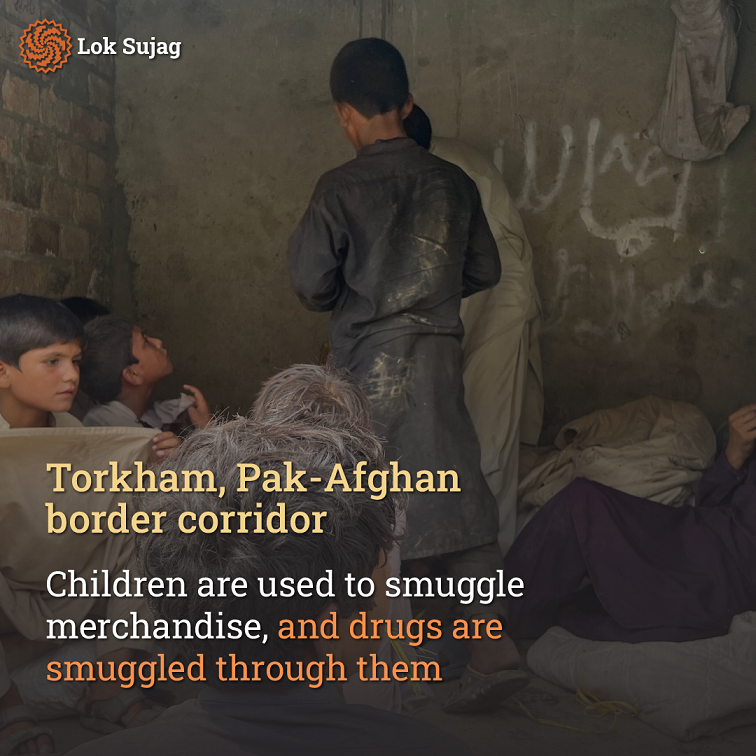
Ferman Shinwari mentioned that the number of children working in difficult conditions in Torkham has increased due to the arrival of the Taliban in Afghanistan and international sanctions. Ten of 100 children are Pakistani, while the rest are Afghan. Most of these children are the sole breadwinners of their homes whose elders have died or become disabled in various incidents.
Without revealing his name, an official of the Landi Kotal Sub Jail mentioned that in Torkham, children are used for smuggling commercial goods and drugs smuggling. He stated that in the past year, 20 children were arrested, but due to the lack of a specific place for children in the jail, their cases are quickly dealt with and legal action is taken. He further stated that a significant number of arrested children are Afghan, and they are later handed over to Afghan authorities.
What is the number of child labourers?
The exact number of child labourers in Khyber Pakhtunkhwa is unavailable, according to Imran Takkar, a social worker actively involved in advocating for the rights of child labourers in the province. He mentioned that there is no comprehensive data or effective planning by the government to address the issues faced by child labourers in the region, making it difficult to ascertain the exact number of child labourers.
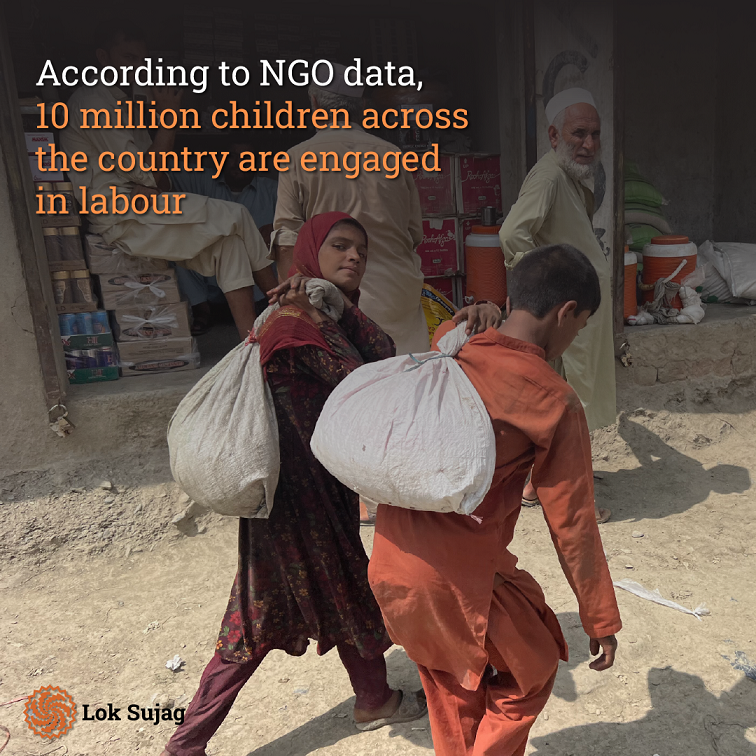
According to the last survey conducted in 1996, around 3.3 million children in Pakistan were engaged in various forms of child labour in specific sectors. Of these, a significant number, approximately 1 million children, were from Khyber Pakhtunkhwa. However, tribal areas, Afghan refugees, and informal sectors were not included in this survey.
In response to a question, he mentioned that according to non-governmental organisations’ estimates, approximately one crore (10 million) children are engaged in child labour across the country. The head of the Child Protection and Welfare Commission in Khyber Pakhtunkhwa, Ajaz Muhammad Khan, emphasised the importance of collecting accurate data for effective efforts to combat child labour. He mentioned that the Labor Department is actively working on data collection. Hopefully, the numbers will be available by September of the current year in relation to efforts to prevent child labour.
In response to a question about the delay in the survey, they mentioned that the survey was initiated during a time when the whole country was grappling with the COVID-19 pandemic, and the entire system of life had come to a standstill.
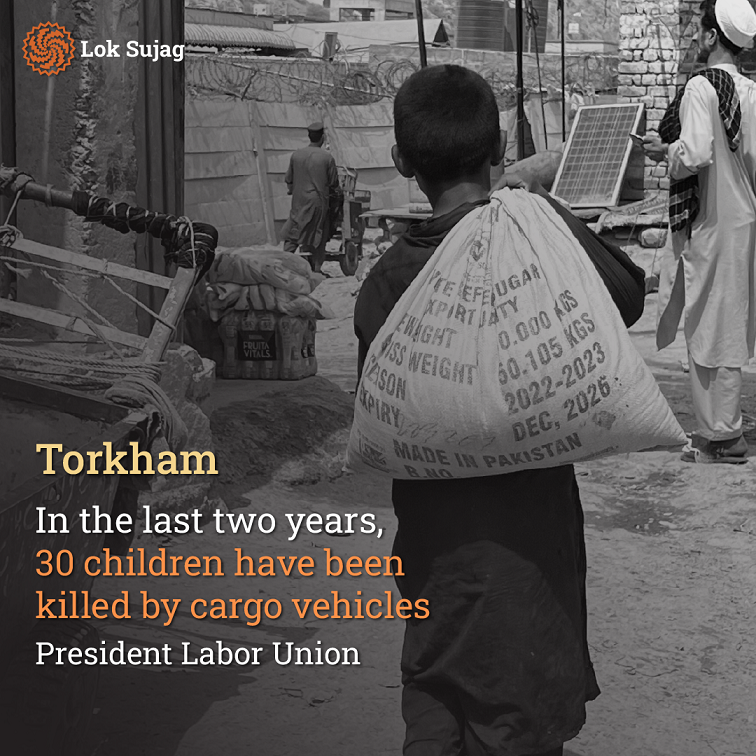
“The formal data collection work for the survey began in January 2022. After the data collection phase in October 2022, the data validation and correction process started, which was completed in April 2023. It took five months to compile the report. The commission identified Afghan children who were victims of various issues and, with the help of the mentioned authorities, reached out to their families in Afghanistan. Currently, more than thirty Afghan children are present in the commission’s rehabilitation centres.”
The Child Protection Commission has 31,000 cases registered from 2011 to the present, with most of them resolved. From June 2021 to August 2023, the commission has registered 370 cases of Afghan migrant children, which have been referred to relevant authorities for resolution.
Child protection laws
In Khyber Pakhtunkhwa, after amendments to the Protection of Children and Welfare Act 2010, it was re-passed in 2015, the Compulsory Primary to Secondary Education Act 2017, the Prevention of Child Labor Amendment Act was enacted in 2015, in which the conditions regarding child labour were clarified.
Also read
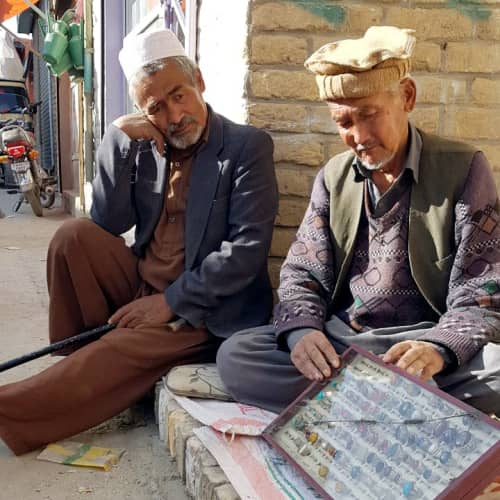
Hazara Shias of Afghanistan: ‘Taliban are killing us because of our faith and ethnicity’
After the increase in cases of sexual violence against children in Khyber Pakhtunkhwa, there was increased pressure from social activists and the public to bring amendments to the Protection of Children Act 2010. The bill was presented in the provincial cabinet in 2021 and the draft of the bill was unanimously approved by removing its disputed part.
The proposed amendment seeks to make public a video of the hanging of child sexual offenders, which was dropped from the bill after dissenting opinions emerged.
According to the amended law, a person involved in child sexual abuse will be punished with life imprisonment, a death sentence and a fine of up to Rs 5 million. Making videos of child sexual abuse will attract 20 years in jail and a fine of Rs 7 million while sharing the video will attract ten years in jail and a fine of Rs 2 million. The bill removed the death penalty and amputation of the sentence for a sexual assault convict.
Published on 9 Oct 2023
